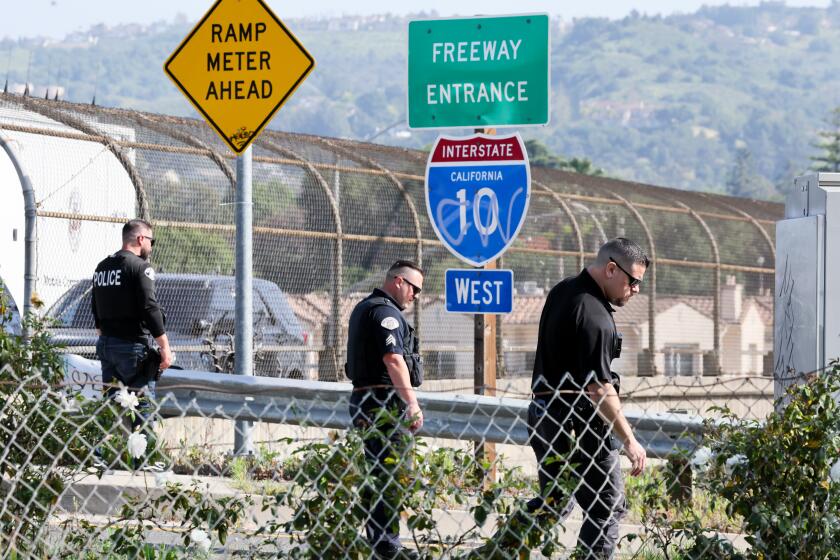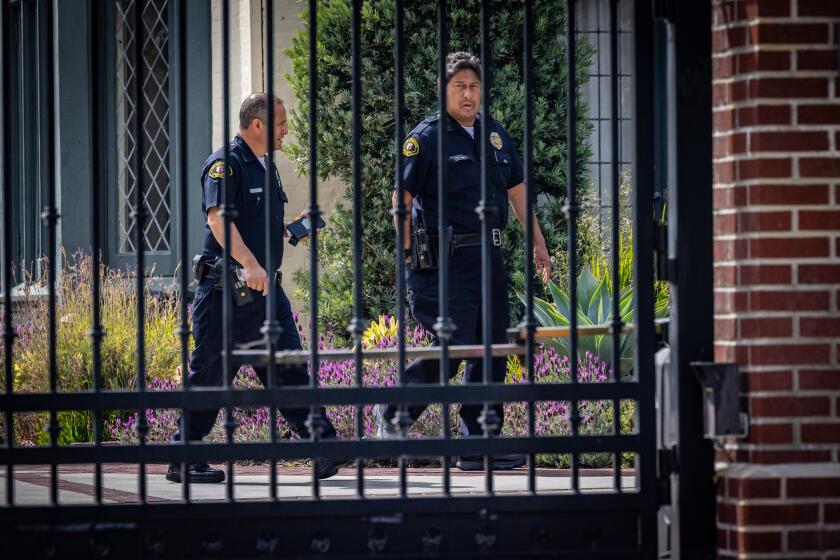Killer gets life sentence for burning homeless man to death
Police were initially baffled when someone killed a popular and friendly homeless man by dousing him with gasoline and setting him on fire in the Koreatown area of Los Angeles.
But homicide detectives soon zeroed in on Ben Matthew Martin, a man obsessed with cleanliness who also had a history of run-ins with the homeless.
Martin, they discovered, had worked at a barbershop near the crime scene and was known for yelling at street people who lingered in the area. In the summer of 2008, he was fired when his boss learned he had struck a homeless man with a bag of towels and kicked him in the back. The victim, John McGraham, was a fixture in the densely populated neighborhood west of downtown Los Angeles, where residents and merchants would bring him food and clothes.
Three months later, prosecutors say, Martin returned with a can of gasoline and an emergency road flare seeking revenge on McGraham, 55.
On Wednesday, Martin, 31, sat silently with his head bowed in a downtown courtroom during an emotional hearing as a judge sentenced him to life in prison without the possibility of parole.
Behind him sat friends and relatives of McGraham — some wearing “Justice 4 John” shirts with a photo of the bearded man. Susanne McGraham Paisley sobbed as she told Los Angeles County Superior Court Judge Terry A. Bork how she often wondered about her brother’s last thoughts as he tried to escape the man pouring gasoline on him.
“Many people saw my brother as a homeless person, a bum,” she said while holding a large picture of a young, clean-shaven McGraham smiling broadly. “This is how we remember him — a human being who had a life with aspirations and dreams.”
Paisley said she hoped her brother’s killing, which at the time made headlines across the country, would stir renewed empathy for the homeless.
“There are a lot of people who as a result might take a different look at the homeless,” she said. “John was kind and thoughtful and didn’t want to hurt anyone.”
Homeless advocates say the Oct. 9, 2008, killing highlighted the dangers of living on the streets.
McGraham was one of 27 homeless people killed in 2008 by non-homeless suspects across the country, according to the National Coalition for the Homeless, which tracks such attacks.
Martin’s attorney, Los Angeles County Deputy Public Defender Regina A. Laughney, stated in a court filing this week that her client took “full responsibility for his actions” by pleading guilty last month.
The crime, she wrote, could be explained in part by Martin’s “well-recognized and documented history of psychological illness.” She said co-workers described him as “not normal” and “not right … mentally.”
She declined to elaborate Wednesday.
Martin told a probation officer that he had been diagnosed as bipolar but did not take medication, according to a court report.
In the 1980s, McGraham worked as a bellhop at the old Ambassador Hotel before he fell into a depression and lost his job. He rebuffed his family’s efforts to take him in and made the streets his home for two decades.
He spent most of his last days near 3rd Street and Vermont.
Martin worked nearby at the Star Barber Shop for about a year, the shop’s manager, Jose Rodriguez, said in an interview this week. Rodriguez tried to teach Martin how to cut hair but said Martin was “a very slow learner.” He spent most of his job ensuring that the shop — with its framed photos of the Twin Towers and Statue of Liberty — was spotless. The work fit well with Martin’s personality.
“He was very clean all the time,” Rodriguez said.
But when Rodriguez learned that his employee had chased and beaten McGraham in the summer of 2008, he immediately let him go.
At the scene of the killing, police discovered a gasoline can, a bucket used to pour gas on the victim, and a pair of black Nike gloves that smelled of gasoline, according to court records. Tests on the gloves found DNA that was linked to Martin, who had convictions for embezzlement, a drug offense, reckless driving and disturbing the peace.
Several people who witnessed the attack picked out a photo of Martin as the assailant.
LAPD homicide Dets. Mike Whelan and Grace Garcia traced the serial number on the gasoline can to a Pep Boys store on Hollywood Boulevard. Store records showed it had been bought along with a plastic bucket and a road flare hours before the attack.
A customer at the store tentatively identified Martin as the man who made the purchase. Martin, police discovered, lived near the store.
“I can’t think of a more horrible way to die,” Los Angeles County Deputy Dist. Atty. Renee Rose said after Wednesday’s hearing. “It’s one of the most heinous crimes you can commit on another human being.”
More to Read
Start your day right
Sign up for Essential California for news, features and recommendations from the L.A. Times and beyond in your inbox six days a week.
You may occasionally receive promotional content from the Los Angeles Times.







